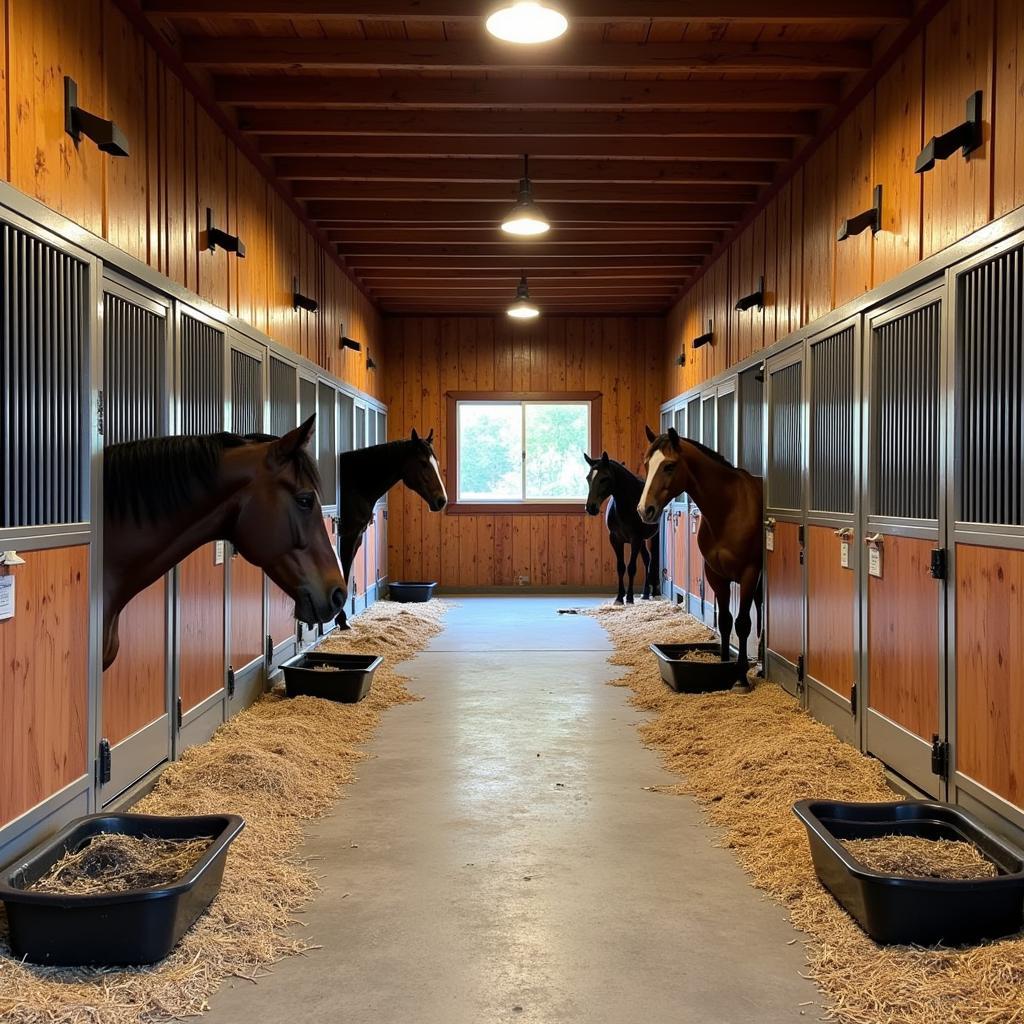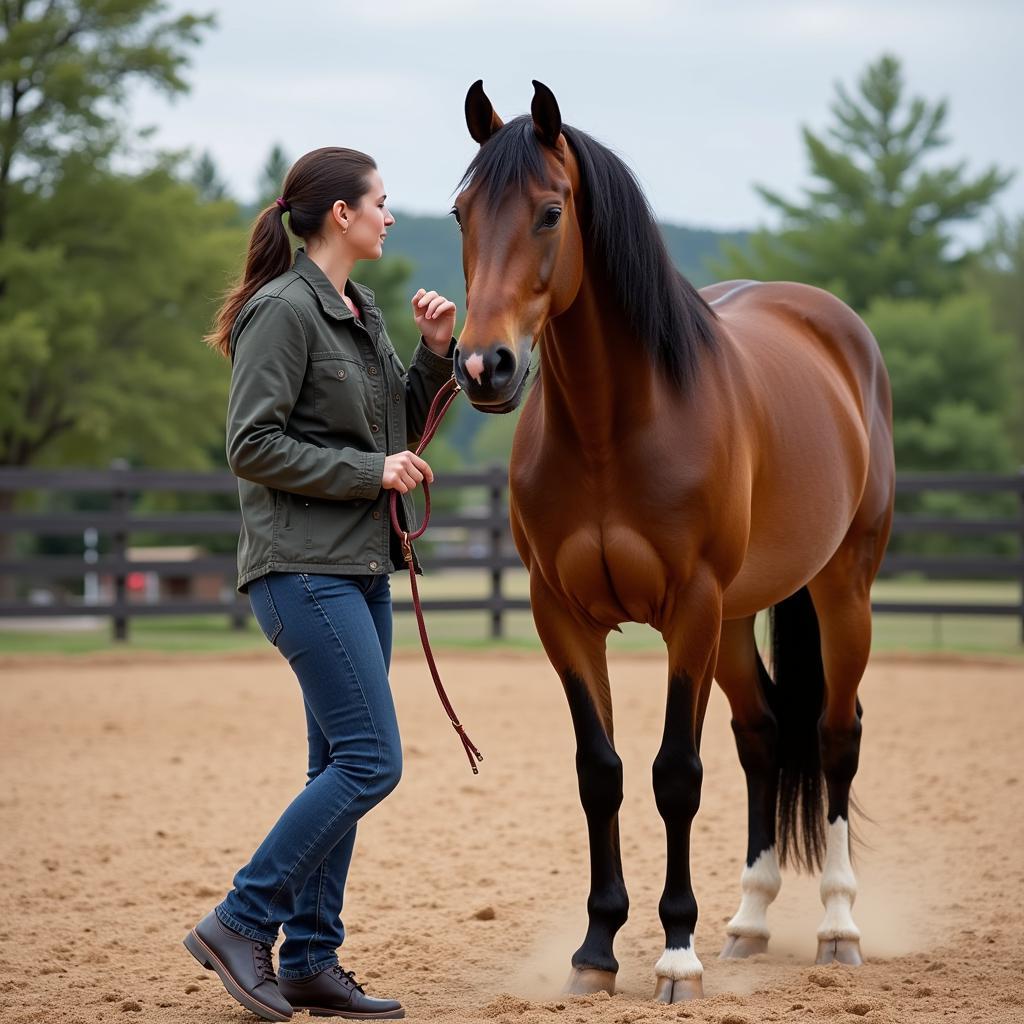Horses In A Ranch represent a vital part of its ecosystem, playing roles ranging from working partners to beloved companions. Whether you’re considering purchasing your first ranch horse or are a seasoned rancher looking to optimize your horse care, understanding their unique needs is essential. This guide will delve into the various aspects of caring for horses in a ranch environment.
The Diverse World of Ranch Horses
Ranch horses are not a single breed but rather a type of horse selected for their temperament, athleticism, and ability to perform various tasks. From herding cattle to traversing challenging terrain, these horses embody the spirit of the American West. Common breeds found on ranches include Quarter Horses, known for their agility and cow sense, and American Paint Horses, prized for their versatility and striking coat patterns. You might find suitable horses at a three horses ranch. Other breeds like Appaloosas, with their distinctive spotted coats, and Mustangs, known for their hardiness and endurance, also contribute to the rich tapestry of horses in a ranch setting.
Selecting the Right Ranch Horse
Choosing the right horse for your ranch depends on your specific needs and the type of work the horse will be performing. Consider factors such as the horse’s age, training, temperament, and physical condition. Are you looking for experienced California ranch and trail horses? A young, energetic horse might be suitable for fast-paced cattle work, while a calmer, more experienced horse might be better suited for trail riding or leisurely ranch work.
Essential Care for Ranch Horses
Providing proper care is crucial for maintaining the health and well-being of horses in a ranch environment. This includes providing nutritious feed, clean water, regular veterinary care, and a safe and comfortable living space.
Nutrition and Feeding
A balanced diet is essential for a ranch horse’s energy levels, performance, and overall health. The type of feed and the amount will vary depending on the horse’s age, workload, and the time of year. During periods of intense work, horses require higher calorie intake. Consult with a veterinarian or equine nutritionist to create a customized feeding plan that meets your horse’s individual needs.
Shelter and Housing
Horses require adequate shelter to protect them from the elements. A well-maintained barn or stable provides protection from rain, wind, and extreme temperatures. Ensure proper ventilation to minimize respiratory issues. Pastures should be spacious and free from hazards, offering ample grazing opportunities.
 Essential Care for Ranch Horses
Essential Care for Ranch Horses
Health and Veterinary Care
Regular veterinary check-ups, vaccinations, and dental care are vital for preventing and managing health issues. Horses on a ranch are exposed to various environmental factors that can increase the risk of illness or injury. Early detection and treatment are key to ensuring your horses remain healthy and productive. Perhaps you are looking for ranch horses for sale in Arizona and need advice? Justus Horses can help!
“Regular hoof care is just as important as vaccinations,” says Dr. Emily Carter, DVM, an equine veterinarian with over 20 years of experience. “Proper trimming and shoeing are crucial for preventing lameness and ensuring the horse’s comfort and performance.”
Training and Handling Ranch Horses
Training and handling are integral to a ranch horse’s success and safety. Horses need to be responsive to cues and commands, especially in demanding work situations.
Building a Strong Foundation
Start with basic groundwork exercises to establish trust and respect. Introduce new concepts gradually and reinforce positive behaviors with rewards. Consistency and patience are essential for building a strong foundation.
“A well-trained horse is a safe horse,” adds renowned horse trainer, John Riley. “Proper training not only enhances the horse’s performance but also minimizes the risk of accidents and injuries for both the horse and the rider.”
 Training Ranch Horses
Training Ranch Horses
Conclusion
Horses in a ranch are more than just animals; they are partners, companions, and essential contributors to the ranch’s operation. By providing proper care, nutrition, training, and handling, you can ensure your ranch horses thrive in their environment and continue to be valuable assets for years to come. Understanding the nuances of caring for horses in a ranch setting is a continuous learning process, and investing in their well-being will ultimately benefit both the horses and the ranch itself. You may also be interested in finding horses for sale billings mt.
FAQ
- What are the most common breeds of ranch horses?
- What is the average lifespan of a ranch horse?
- What are the essential nutritional needs of a ranch horse?
- How often should a ranch horse receive veterinary care?
- What are the basic training principles for a ranch horse?
- What type of shelter is best for ranch horses?
- How can I prevent common health problems in ranch horses?
For support, contact us at Phone Number: 0772127271, Email: [email protected] Or visit us at: QGM2+WX2, Vị Trung, Vị Thuỷ, Hậu Giang, Việt Nam. We have a 24/7 customer care team.